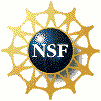
FY 2001 - 2006
| CONTENTS About the NSF NSF Role I. Introduction II. Vision and Mission III. Outcome Goals IV. Strategy Appendices: Appendix 1: Critical Factors for Success Appendix 2: External Factors Affecting Success Appendix 3: Assessing NSF’s Performance Appendix 4: Integration of NSF Plans with those of Other Agencies Appendix 5: Resource Utilization Appendix 6: Linking the Strategic Plan to the Performance Plan Appendix 7: Crosswalk of NSF Goals and Programs How We Operate Our Attributes National Science Board Director's Policy Group |
APPENDIX 1: CRITICAL FACTORS FOR SUCCESS
Excellence in managing the agency’s activities underpins all of NSF’s goals. Four factors are especially critical to NSF's goal achievement.
Factor 1: Operating a credible, efficient merit review system.
NSF’s merit review process is the keystone for award selection. All proposals for research and education projects are evaluated using two criteria: the intellectual merit of the proposed activity and the broader impacts of the activity on society. Specifically addressed in these criteria are the creativity and originality of the idea, the development of human resources, and the potential impact on the research and education infrastructure.
The merit review system is at the very heart of NSF's selection of the projects through which its outcome goals are achieved. Ensuring a credible, efficient system requires constant attention and openness to change.
Implementation Strategies
-
Regularly assess performance of all aspects of the merit review system, comparing its efficiency, effectiveness, customer satisfaction and integrity against similar processes run by other organizations.
-
Promote the use of both merit review criteria (i.e. intellectual merit and broader impacts) in the evaluation of proposals.
-
Develop alternative mechanisms for obtaining and reviewing proposals and evaluating their potential for use in determining NSF's investments.
-
Reduce the burden on proposers and reviewers while maintaining the quality of decision processes, by increasing award size and duration.
Factor 2: Exemplary use of and broad access to new and emerging technologies for business application.
NSF has moved aggressively to adopt new technologies in our business processes. NSF must sustain and further develop exemplary mechanisms to streamline business interactions, enhance organizational productivity, ensure accessibility to a broadened group of participants, and maintain financial integrity and internal controls.
Implementation Strategies
-
Implement full electronic proposal receipt, review, processing and award, to reduce the administrative burden on staff and partner institutions, and eliminate paper materials wherever possible.
-
Implement a high-quality communications infrastructure and state-of-the-art technological tools to enhance organizational productivity.
-
Maintain financial and award system integrity through rigorous systems standards and controls and continual system improvements.
Factor 3: A diverse, capable, motivated staff that operates with efficiency and integrity.
NSF is dependent on the capability and integrity of its staff. Innovative methods of recruitment, development, and employee recognition will be needed to meet the challenges of the future.
Implementation Strategies
-
Provide a learning environment where the ideas and opinions of program officers and support staff are highly valued by management.
-
Sustain a recruitment and retention policy that enables personnel searches that focus on excellence and diversity in the workplace.
-
Invest in staff development and provide training on continuing issues of importance such as avoiding conflicts of interest and on new directions such as electronic proposal submission.
-
Improve the participation of underrepresented groups in both career and temporary positions.
-
Explore new mechanisms for the recruitment and employment of scientists, engineers, and educators at NSF.
-
Use flextime, flexplace, telecommuting, independent research and development plans, and related tools of the work environment to maximize staff productivity and growth.
Factor 4: Implementation of mandated performance assessment and management reforms in line with agency needs.
An organization that is dependent on public funds must be accountable to the public. The development and use of effective indicators of agency performance -- measuring NSF's ability to meet mission-oriented goals, our competent use of resources in the investment process, and our efficiency and effectiveness as a reliable partner to others -- are needed to better explain the agency's role to the public.
Implementation Strategies
-
Assess the reliability, completeness, appropriateness and usability of NSF's management data systems as they support GPRA and the CFO Act.
-
Work with academic institutions and other grantees to assure reliable, valid collection of project reporting information.
-
Align individual performance plans with agency and organizational plans and with the changing technologies and needs of the workplace.
-
Continue to develop appropriate standards and indicators of success for reporting systems.
| NSF ~ OD ~ OIA | |